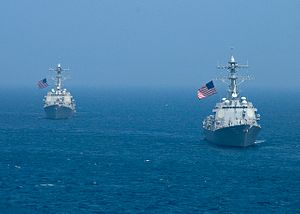U.S. freedom of navigation operations (FONOPs) in the South China Sea will increase not only in number but also in scope and complexity amid China’s growing control of surrounding waters, the commander of the U.S. military forces in the Asia-Pacific said Tuesday.
While U.S. officials are fond of reiterating that FONOPs have been in place for decades and are not directed at any one country, the FONOP conducted by the USS Lassen last October by transiting inside 12 nautical miles of five maritime features in the Spratly Islands claimed by China, Taiwan, Vietnam and the Philippines last year had drawn Beijing’s ire. Since then, many have been wondering about the future shape of U.S. FONOPs, including which features might be included as well as whether Washington could begin doing them with other allies and partners such as Japan and Australia.
Speaking on January 27 at the Center for Strategic and International Studies (CSIS), a Washington, D.C.-based think tank, Admiral Harry B Harris Jr., the commander of the U.S. Pacific Command (PACOM), confirmed that U.S. FONOPs can be expected to not only become greater in number, but also more broader in scope as well as more complex.
“I think that as we continue down the path of freedom of navigations, you will see more of them, and you will see them increasing in complexity and scope in areas of challenge, Harris said in response to a question at the event.
He declined, however, to provide more details about future operations
“Beyond that, I’m not going to give you the details or the specifics of the next operation and what it’s going to challenge and when it’s going to challenge and all that,” he said.
More generally, Harris reiterated his concerns about Chinese actions in the South China Sea, including Beijing’s artificial island-building campaign which had involved reclaiming a staggering 3000 acres of land in just two years. If China continues to build out features in the South China Sea, he warned that by 2020 Beijing would effectively control the waters – through which 5 trillion dollars of global trade pass – with only Washington being able to challenge it.
“They will control the South China Sea against all the militaries out there with the exception of the U.S. military in all scenarios short of war,” he said.
Harris also said he worried that as coast guard and fishing vessels by China and other claimant states try to protect their own interests as well as those of their government, they risk triggering conflict among nations and dragging in the United States as well.
“Their involvement with each other could then trigger military forces of the nations involved which could trigger treaty obligations with us depending on the nations involved,” he said.
“These tactical actions can have strategic implications. I worry about that,” he added.
































